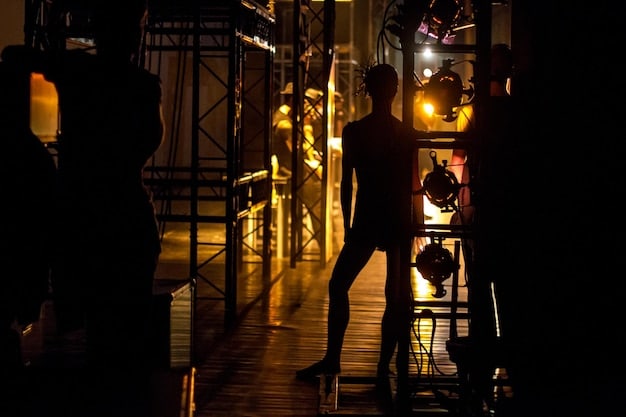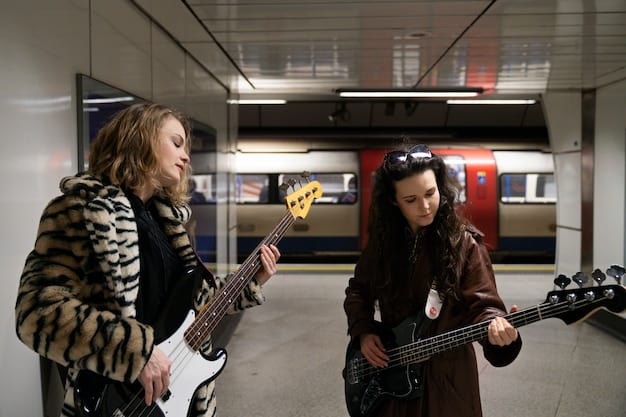Networking for Success: A Guide for Emerging Rock Artists at Music Industry Events

Emerging rock artists can significantly boost their careers by mastering effective networking strategies at music industry events, turning connections into opportunities.
For emerging rock artists, music industry events are prime opportunities to connect with influential figures who can shape their careers. However, merely attending isn’t enough; strategic networking is crucial for making lasting impressions and forging valuable relationships.
Navigating the Music Industry Event Landscape
The music industry is a multifaceted world where who you know can often be as important as what you know. Music industry events, such as conferences, showcases, and festivals, provide fertile ground for emerging rock artists to connect with industry professionals, fellow musicians, and potential fans.
Understanding the lay of the land is crucial before diving into the networking pool. Each type of event caters to different segments of the industry, and knowing what to expect will help you tailor your approach.
Researching Events to Attend
Choosing the right events is the first step toward fruitful networking. Look for events that align with your genre, career goals, and current stage in your musical journey.
- Industry Conferences: Offer educational panels, workshops, and networking sessions. Perfect for gaining insights and meeting industry veterans.
- Music Festivals: Provide a platform to showcase your talent and connect with potential fans and booking agents.
- Local Showcases: Ideal for building your local network and gaining exposure within your community.
Thorough research will help you narrow down your options and focus your energy on events that offer the most potential for career advancement.
In conclusion, navigating the music industry event landscape requires understanding what the event entails, researching before hand, and making sure the particular events aligned with your specific musical career goals.
Crafting Your Personal Brand
In the competitive music industry, your personal brand is your calling card. It’s how you present yourself to the world and what sets you apart from other artists.
Developing a strong and authentic personal brand is essential for making a memorable impression at music industry events. It’s about showcasing your unique identity and values as an artist.
Defining Your Unique Selling Proposition (USP)
What makes you different? What unique value do you bring to the table? Identifying your USP is crucial for crafting a compelling personal brand.
- Musical Style: Is your music a unique blend of genres? Highlight what’s distinctive about your sound.
- Stage Presence: Are you known for your energetic performances? Emphasize your ability to captivate audiences.
- Personal Story: Do you have a compelling story that resonates with your music? Use it to connect with people on a deeper level.
Defining your USP will give you a clear message to communicate when networking and help you stand out from the crowd. Authenticity is important here and your USP must be honest even if it seems somewhat mundane from your perspective.

In conclusion, crafting your personal brand in the music industry is much like presenting yourself on the most flattering stage. Defining your persona through your musical style, your stage persona, and your personal story all work to help create the best image as possible and have a compelling USP or Unique Selling Proposition that will get your band noticed.
Mastering the Art of Conversation
Networking is fundamentally about building relationships, and effective conversation is the cornerstone of relationship building. At music industry events, you’ll have countless opportunities to engage with people from all walks of the industry.
Mastering the art of conversation will enable you to make meaningful connections and leave a lasting impression. It’s about being a good listener, asking thoughtful questions, and sharing your story in an engaging way.
Starting Conversations with Confidence
Approaching someone new can be daunting, but a few simple techniques can help you break the ice and start conversations with confidence.
- The Compliment: A genuine compliment can be a great way to start a conversation. For example, “I really enjoyed your panel discussion on songwriting.”
- The Common Ground: Find something you have in common with the other person. For example, “I noticed you’re wearing a band t-shirt. Are you a fan of [band name] too?”
- The Direct Approach: Simply introduce yourself and explain why you wanted to connect. For example, “Hi, I’m [your name], a rock artist. I’m interested in learning more about your work with emerging bands.”
Starting conversations doesn’t have to be nerve-wracking. By being friendly, approachable, and genuinely interested in others, you can create a welcoming atmosphere and initiate meaningful interactions.
In conclusion, the ability to master the art of conversation is paramount to success in any endeavor and in the music industry this is no exception. Starting conversations confidently and being genuine when doing so is the key.
Strategic Follow-Up Techniques
Networking doesn’t end when the event is over. In fact, the follow-up is often where the real magic happens. It’s where you solidify connections and turn initial meetings into lasting relationships.
Strategic follow-up techniques are essential for nurturing your network and maximizing the value of your interactions at music industry events. It’s about staying top of mind and demonstrating your commitment to building mutually beneficial relationships.
Personalized Email Strategies
Generic follow-up emails are easily ignored. Personalized emails, on the other hand, show that you value the connection and remember the details of your conversation.

- Reference Specific Details: Mention something you discussed during your conversation to jog their memory.
- Offer Value: Provide helpful resources, introduce them to other relevant contacts, or offer your support in some way.
- Keep it Concise: Get straight to the point and respect their time.
Personalized emails demonstrate your attentiveness and genuine interest in building a relationship, increasing the likelihood of a positive response.
To Conclude, networking is an essential skill and after the event ends being able to successfully follow up with leads and useful context can determine a lot of success.
Leveraging Social Media for Networking
In today’s digital age, social media is an indispensable tool for networking. It allows you to connect with people from all over the world, showcase your work, and stay informed about industry trends.
Leveraging social media effectively can amplify your networking efforts and create a vibrant online presence that attracts opportunities. It’s about building a community around your music and engaging with your followers in meaningful ways.
Optimizing Your Online Profiles
Your social media profiles are often the first impression people have of you. Make sure they accurately reflect your personal brand and showcase your best work.
- Professional Headshot: Use a high-quality photo that represents your style and personality.
- Compelling Bio: Write a concise and engaging bio that highlights your unique selling proposition.
- High-Quality Content: Share your music, videos, behind-the-scenes content, and updates on your career.
Optimizing your online profiles will ensure that you make a strong first impression and attract the right kind of attention.
To Conclude, leveraging social media is crucial for the development of any brand, being able to optimize your brand to increase its value is very important.
Attending After-Parties and Informal Gatherings
Music industry events extend beyond the official daytime programming. After-parties and informal gatherings often provide a more relaxed and intimate setting for networking.
These events offer a chance to connect with people on a more personal level, away from the structured environment of the conference floor. It’s about building rapport, sharing stories, and forging genuine connections.
Building Rapport in Relaxed Settings
After-parties are not just for socializing; they can be valuable networking opportunities if approached strategically.
- Be Approachable: Smile, make eye contact, and be open to meeting new people.
- Listen Actively: Show genuine interest in what others have to say.
- Avoid Being Pushy: Don’t bombard people with self-promotion; focus on building relationships.
Building rapport in relaxed settings can lead to deeper connections and unexpected opportunities down the road.
In conclusion, after-parties and informal interactions open a whole new avenue to success in the music industry. Being approachable, listening, and making the right impression is always key.
Measuring Your Networking Success
Networking is an ongoing process, and it’s important to track your progress and measure your success. This will help you identify what’s working, what’s not, and where to focus your efforts.
Measuring your networking success involves setting clear goals, tracking your interactions, and analyzing the results. It’s about understanding the impact of your networking efforts on your career and adjusting your strategy accordingly.
Tracking Contacts and Interactions
Keeping a record of your contacts and interactions is essential for effective networking.
- Contact Management System: Use a CRM or spreadsheet to track contact information, notes from conversations, and follow-up actions.
- Set Reminders: Schedule reminders to follow up with contacts at regular intervals.
- Analyze Results: Review your networking activities periodically to assess your progress and identify areas for improvement.
Tracking your networking efforts will give you valuable insights into your progress and help you make informed decisions about your networking strategy.
To Conclude, one can see the important benefit of measuring your own success to make even more moves in the future. This gives real information to make actual intelligent moves.
| Key Point | Brief Description |
|---|---|
| 🎫 Event Research | Find events that align with your music genre and career goals. |
| 🎤 Brand Identity | Clearly define what makes you unique as an artist. |
| 🗣️ Conversation Skills | Practice initiating and maintaining engaging conversations. |
| 📱 Social Media Strategy | Use social platforms to amplify connections made in person. |
FAQ
▼
Look for showcases, conferences, and festivals focused on rock or indie music. Research events where you can perform and network with industry professionals.
▼
Have your elevator pitch ready and business cards handy. Research attendees beforehand and set specific goals for who you want to meet or connect with.
▼
Introduce yourself, briefly explain your music journey, and ask about their experiences or advice. Listen attentively and show genuine interest in what they have to say.
▼
Send a personalized follow-up email within 24-48 hours. Reference specific details from your conversation and offer a way to continue the dialogue or collaboration.
▼
Avoid being overly pushy, unprepared, or uninterested. Be respectful, genuine, and focus on building organic connections rather than immediate gains.
Conclusion
In the landscape of emerging rock artists, mastering the nuances of networking at music industry events is a game-changer. By understanding the event landscape, crafting a compelling personal brand, and honing your conversation skills, you can forge meaningful connections and navigate the industry with confidence. Strategic follow-ups, effective social media usage, and relaxed after-party interactions will amplify your efforts, while consistently tracking your progress ensures that your networking leads to tangible career advancement. To Conclude, one can see the important benefit of measuring your own success to make even more moves in the future. This gives real information to make actual intelligent moves.





